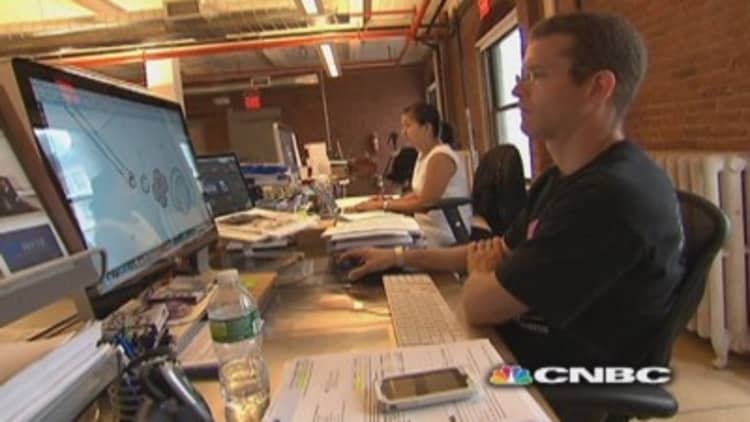
The job market finally seems to be looking up, and so are the hopes of college seniors.
That's nice in terms of consumer confidence. But these about-to-be college graduates may want to reset their expectations. Even as hiring is picking up, employers are still complaining that they can't find workers with the right skills. And companies are mostly unwilling to do more than complain.
Only 48 percent of 2012-2013 college graduates say they have received on-the-job training, according to a recent report by Accenture. But 69 percent of college seniors say they will need more training or education after graduation to get the job they want—and 80 percent expect a formal training program when they land with a new employer.
That's even more optimistic than a year ago, when 77 percent of college seniors expected to get on-the-job training.
"They know they need training and it's really important for them. The generation before them used to get it, so there is no reason for them not to expect it," said Peter Cappelli, a professor of management at the University of Pennsylvania's Wharton School. "The problem is, the companies have backed away from training, with the exception of the consulting firms and the banks."
The report is the latest indication that milllennials' view of their workplace prospects is too rosy. In a survey of 15-to 27-year-olds by the National Society of High School Scholars, 48 percent said they expected to find jobs in their chosen fields soon after graduating from college. The Accenture survey found that 46 percent of 2012-2013 graduates are working in jobs that do not require a college degree, up from 41 percent a year earlier.
As for actual employment, at the time the survey was conducted in March, 11 percent of college seniors had landed jobs, down from 16 percent a year earlier.

But it's not just the fault of overly confident millennials. Even as employers cut back on training programs, they give college graduates poor marks on job preparedness. In a survey by Bentley University, 35 percent of business leaders gave a grade of C or lower to the preparedness of the recent college graduates they have hired.
Without employer training, it's hard to see how students can boost their preparedness and hard skills. "Schools are not set up to provide work experience, and that's what employers want," Cappelli said. "The idea that schools can provide kids with specific computer skills doesn't work either, because by the time they graduate, that skill will be out of date."
The good news is that employers' attitudes about hiring inexperienced workers may be starting to change. At least that's the view of David Smith, global managing director of Accenture Talent & Organization.
Smith argues that with the economy recovering and hiring on the rise, employers will soon feel more pressure to make themselves attractive to the strongest job candidates, instead of all the onus being on job seekers. After all, this is a generation that is unusually willing to turn to entrepreneurship when they don't land the jobs they want, so employers have less leverage to keep them hanging around. One way they can, though, is by offering training.
"Employers in the tougher economic times in the last four years have probably dialed back" on training, Smith said. But now, "I think the changes that are going on in the marketplace make training dynamic today. It's not just going to occur in years one through four of university study. It has to occur throughout their employment and life cycle. No question, employers are thinking about changing their approach to training."
College seniors, don't chuck those three ring notebooks just yet. On-the-job training is rarer than you think—but if Smith is right, you may need to be taking notes again before long.




